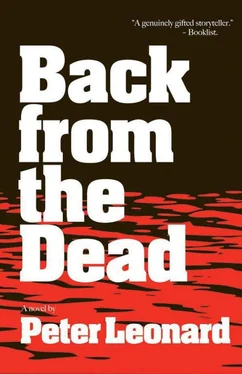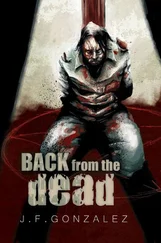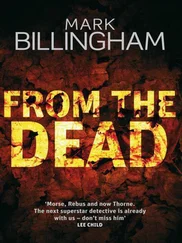Zeller stopped at a hardware store on Federal Highway, bought what he needed and went back to the motel. He turned on the TV, stretched out on the bed and watched a western called Gunsmoke. From what Zeller could understand, it was about a lawman, Marshall Dillon, who had some kind of relationship with Miss Kitty, who ran a bordello.
Just after midnight, Zeller took his hardware-store purchases out to the car. It was dark and quiet. He could feel a cool breeze blowing in from the ocean, smelling the salty air. He drove over the bridge and through the neighborhood to Max Hoffman’s house, parked on the empty street next to the vacant lot. Sat for a minute, looking around. All the houses were dark. It was so quiet he could hear himself breathe. He got out of the car, walked to the rear of the house, standing on the patio, looked through the French doors into the dark interior, saw the shapes of furniture. Behind him, a breeze ruffled the canvas awning. He saw a light coming toward him on the waterway and heard a boat go by, engine at low rpm. He took the supplies out of the paper bag and laid them on the patio stones.
The French doors had lever handles, with a simple pin-and-tumbler lock. He slid the tension wrench into the keyhole, turned it to the right, inserted the pick and started lifting the pins. Could hear them click, falling into place, the upper pins going into the housing, the lower pins into the plug. Zeller opened the door, went in, closed it and listened. Silence until the air conditioner kicked on. He glanced down, noticed the floor was tile, unzipped his boots, slipped out of them and moved toward the front of the house, arm outstretched, left hand gripping the Makarov.
Zeller walked past an open room to his left filled with big heavy furniture. Small room with a desk to his right, and next to it, a bedroom with an adjoining bathroom, bed made, currently unoccupied. He saw Hess’ bulky shape under a blanket in the second bedroom and tiptoed in.
“I’ve been expecting you,” Hess said, coming up behind him. “Very carefully, drop your weapon.”
Zeller heard him cock the hammer of a revolver, lowered the pistol and dropped it on the carpeting.
“On your knees.”
Zeller squatted and went down like he was praying. Maybe he should. Hess kicked the gun through the doorway and Zeller heard it slide on the tile floor. Hess bound his wrists and ankles with duct tape, removed his wallet from his rear trouser pocket and sat on the side of the bed. Hess opened the wallet, looked at his driver’s license.
“You are ex-Stasi, aren’t you? The Makarov gives you away. It’s no Walther but it is a fine weapon. Who sent you, Herr Zeller?”
He wasn’t going to say a word.
“Who’re you working for?”
Zeller stared at the wall. Hess got up now, moved behind him and he felt something crash into the back of his head and the lights went out.
Zeller’s head was pounding, the pain more intense now as he was coming awake. What had Hess hit him with, a sledgehammer? He tried to move his arms and legs, and couldn’t, opened his eyes, lifted his head and saw why. He was on his back on a table or workbench, wrists and ankles tied to metal rings, head hanging over one end. There was a rack of tools on the wall to his left and a vice bolted to the end of the bench just beyond his feet. He was in a two-car garage, the big green Chrysler parked next to him. He turned his head the other way and saw the door to the house was open, and now Hess appeared, whistling a Bavarian folk tune, carrying a bucket and a hand towel.
“Ah, Herr Zeller, you’re awake. I want to give you an opportunity to talk before any further unpleasantness,” Hess said, like an affable uncle. Not a nuance of menace in his voice. “What did you do to poor Ingrid?”
Zeller said nothing.
“I have been trying to reach her for several days and she doesn’t answer.” Hess placed the bucket next to Zeller’s hip. “Where is the money?”
“What money?”
“You have it or Ingrid does. I am betting on you.”
Zeller’s head hung off the end of the table at an uncomfortable angle. Hess covered his face with the towel, picked up the bucket and poured water into his breathing passages. Zeller closed his mouth, held his breath as long as he could, pulled at the ropes trying to free himself, turned his head from side to side but the water kept coming and he felt like he was drowning. Zeller heard a phone ringing, sounding faint and far away. Hess stopped pouring, set the bucket down and removed the towel.
“Where is my money?”
Zeller was trying to breathe, sucking air into singed nasal passages and lungs. “I have it,” he said spitting water out of his mouth. “A safe deposit box in Munich.”
Hess said, “Where is Ingrid?”
“I don’t know,” Zeller said, buying himself more time, trying to get his wind back.
“I think you do,” Hess said, standing over him. “Are you thirsty, Herr Zeller? Another drink? You are making it unnecessarily difficult. You are going to tell me what I want to know. There is no reason to be a hero.” Hess paused. “Where is Ingrid?”
“I don’t know.”
Hess put the wet towel over Zeller’s face. He moved his head side to side trying to shake it off, but Hess held it in place.
“I first saw this technique at Dachau, and it was extremely effective. I was surprised to learn that it dates back to the Spanish Inquisition. You can torture your enemy without leaving a mark.” Hess paused. “Water filling the breathing passages triggers the mammalian diving reflex, causing the victim to feel the sensation of drowning. But why am I telling you this, Albin? You already know what it feels like.” Hess picked up the bucket, tilted the spout over Zeller’s face. “Ingrid is dead, isn’t she?” Zeller nodded.
“Who sent you?” Hess’ voice was calm and relaxed. “Who do you work for, the federal police, BKA?” He paused. “It was Steiger, wasn’t it? God knows we’ve had our differences.”
Zeller was familiar enough with the politics of Bavaria to know that Wolfgang Steiger and Ernst Hess had been bitter rivals in the Christian Social Union.
“And if not Steiger, then who?”
Zeller held his breath until he couldn’t, water filling his nose and mouth. Neck muscles bulging, he strained to lift his head up, but Hess held him down. And just as Zeller felt himself starting to fade, Hess stopped pouring and removed the towel. He was coughing up water and trying to draw in air when the doorbell rang.
Hess turned his head, glanced at the open door leading to the house. “How many are working with you?”
The doorbell rang again.
“I am alone.”
“We’ll see,” Hess said. He ripped a strip of duct tape off the roll and pressed it over Zeller’s mouth. “Don’t go anywhere.”
Hess drew a revolver from his pocket and went into the house.
Harry had packed a bag and was getting ready to drive to the airport, catch a flight to Florida, find out what the hell was going on with Joyce, when he got the call. It was a woman with the Detroit police, telling him there had been a homicide at the scrap yard, asking if he could come down right away.
There were two police cars, lights flashing, one in the yard near his night watchman, Columbus Fletcher’s Chevy, which Harry was surprised to see, the other in the parking area by the office. Next to the police car was a black van that said MEDICAL EXAMINER on the side — never a good sign, and next to that was an unmarked Plymouth Harry’d seen before. Phyllis’ VW Bug was in its usual space.
The scene was familiar, almost a duplicate of the morning Harry’d arrived to find police investigating the murder of Jerry Dubuque. There was a cop in uniform standing next to the door.
Читать дальше












